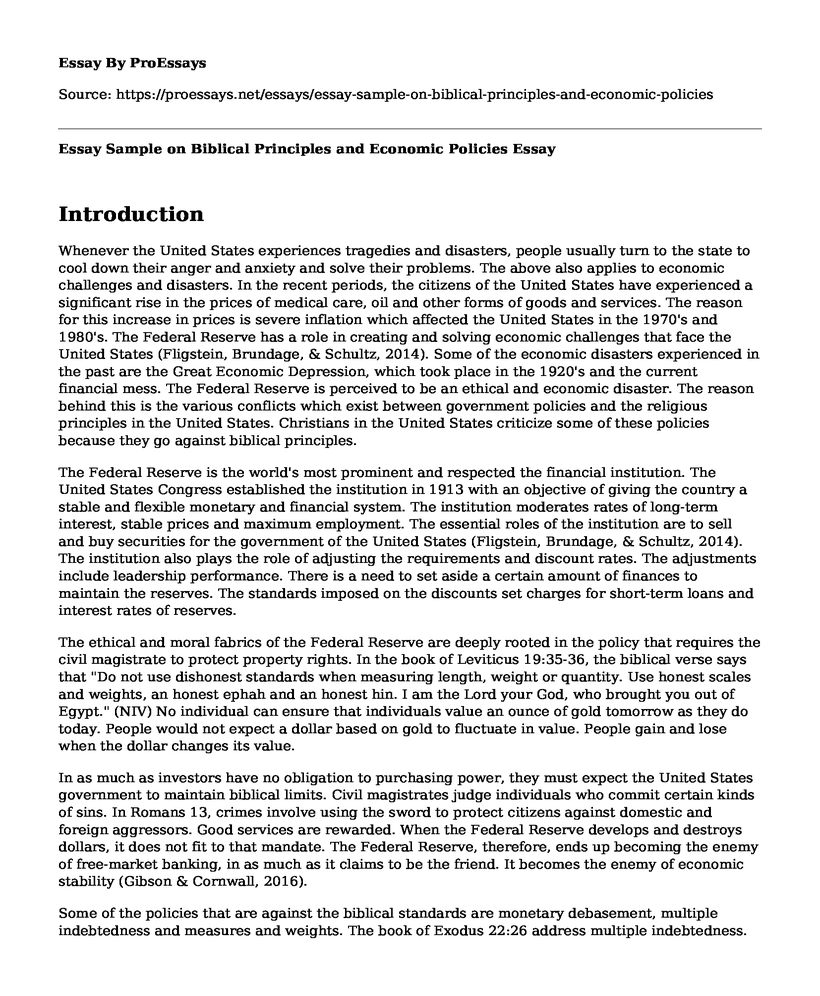Introduction
Whenever the United States experiences tragedies and disasters, people usually turn to the state to cool down their anger and anxiety and solve their problems. The above also applies to economic challenges and disasters. In the recent periods, the citizens of the United States have experienced a significant rise in the prices of medical care, oil and other forms of goods and services. The reason for this increase in prices is severe inflation which affected the United States in the 1970's and 1980's. The Federal Reserve has a role in creating and solving economic challenges that face the United States (Fligstein, Brundage, & Schultz, 2014). Some of the economic disasters experienced in the past are the Great Economic Depression, which took place in the 1920's and the current financial mess. The Federal Reserve is perceived to be an ethical and economic disaster. The reason behind this is the various conflicts which exist between government policies and the religious principles in the United States. Christians in the United States criticize some of these policies because they go against biblical principles.
The Federal Reserve is the world's most prominent and respected the financial institution. The United States Congress established the institution in 1913 with an objective of giving the country a stable and flexible monetary and financial system. The institution moderates rates of long-term interest, stable prices and maximum employment. The essential roles of the institution are to sell and buy securities for the government of the United States (Fligstein, Brundage, & Schultz, 2014). The institution also plays the role of adjusting the requirements and discount rates. The adjustments include leadership performance. There is a need to set aside a certain amount of finances to maintain the reserves. The standards imposed on the discounts set charges for short-term loans and interest rates of reserves.
The ethical and moral fabrics of the Federal Reserve are deeply rooted in the policy that requires the civil magistrate to protect property rights. In the book of Leviticus 19:35-36, the biblical verse says that "Do not use dishonest standards when measuring length, weight or quantity. Use honest scales and weights, an honest ephah and an honest hin. I am the Lord your God, who brought you out of Egypt." (NIV) No individual can ensure that individuals value an ounce of gold tomorrow as they do today. People would not expect a dollar based on gold to fluctuate in value. People gain and lose when the dollar changes its value.
In as much as investors have no obligation to purchasing power, they must expect the United States government to maintain biblical limits. Civil magistrates judge individuals who commit certain kinds of sins. In Romans 13, crimes involve using the sword to protect citizens against domestic and foreign aggressors. Good services are rewarded. When the Federal Reserve develops and destroys dollars, it does not fit to that mandate. The Federal Reserve, therefore, ends up becoming the enemy of free-market banking, in as much as it claims to be the friend. It becomes the enemy of economic stability (Gibson & Cornwall, 2016).
Some of the policies that are against the biblical standards are monetary debasement, multiple indebtedness and measures and weights. The book of Exodus 22:26 address multiple indebtedness. The Federal Reserve however operates on partial baking and this policy violates this principle. The book of Isaiah 1:22 address debasement. The current economic policies violate these essential principles.
The Federal system is a privately owned institution which monopolizes the financial market and this is against free market obligations (Gibson & Cornwall, 2016). The Federal system does not also allow any accounting institution to evaluate its accounting records. The Fed can therefore commit any form of fraud behind people's backs since it would be difficult to notice.
Conclusion
In conclusion, every legally elected government has the responsibility of safeguarding the citizens' rights. The governments should also uphold the ethics, morality and laws governing the country. In most occasions, these policies are designed to oppress the citizens, which is against some biblical teachings. The current economic challenges are therefore attributed to this.
References
Fligstein, N., Brundage, J. S., & Schultz, M. (2014). Why the Federal Reserve failed to see the financial crisis of 2008: the role of "macroeconomics" as a sense making and cultural frame.
Gibson, W., & Cornwall, R. D. (2016). Introduction. In Religion, Politics and Dissent, 1660-1832 (pp. 15-28). Routledge.
Cite this page
Essay Sample on Biblical Principles and Economic Policies. (2022, Jul 15). Retrieved from https://proessays.net/essays/essay-sample-on-biblical-principles-and-economic-policies
If you are the original author of this essay and no longer wish to have it published on the ProEssays website, please click below to request its removal:
- Unity, Relativity and Exclusivity in Christianity
- Globalism Versus Globalization Essay Example
- Effects of a Nuclear-Powered World Essay Example
- Economy of Italy Essay Example
- Essay Sample on Religious Beliefs Religious Beliefs
- Employment Security: Analysis of Outside Sources & Public Policies - Essay Sample
- Gender Pay Gap: Unfair Policies & Poor Protection - Essay Sample







